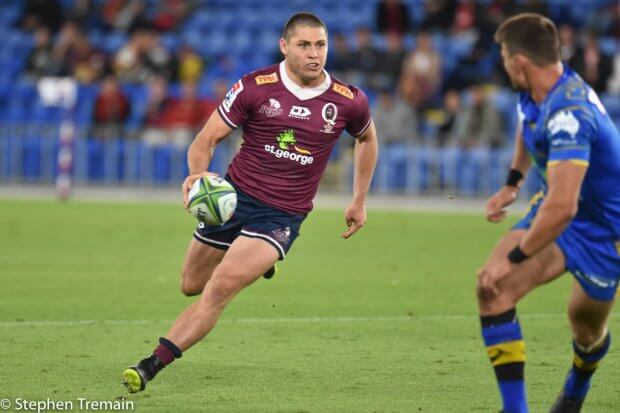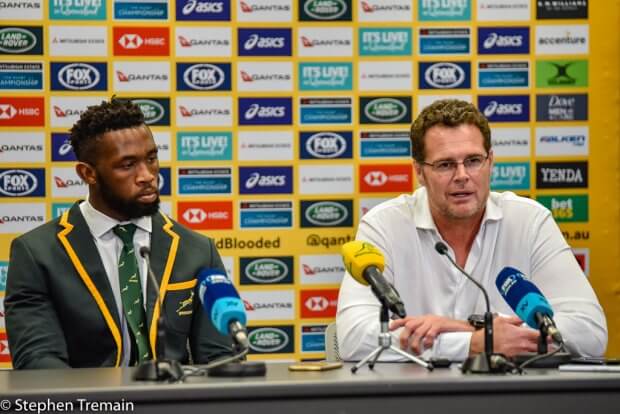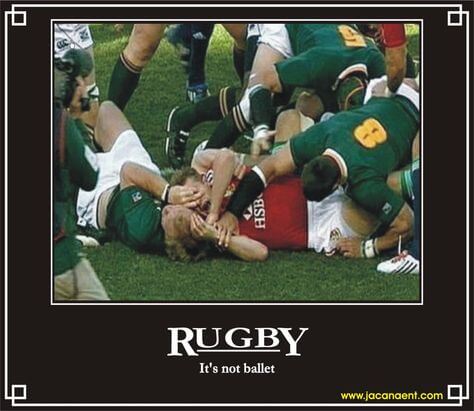Sorry Team, still not the Hoss and so you won’t get to read his witty statements yet
JOC Relinquishes Captaincy

Wallabies veteran James O’Connor has given up the Queensland captaincy as a big 18 months looms for test hopefuls. JOC wants to narrow his focus in the run-up to an inbound England tour and next year’s Rugby World Cup.
JOC agreed to stand in for the injured Wright at the start of last season. He was extremely proud to do this but found that the extra responsibilities took their toll and adversely affected his game. While he was the Super AU top points scorer and led the Reds to a 19-16 win against the Brumbies to claim the title, injury hampered his test career and opened the door for QC to claim the No 10 jersey during the Rugby Championship.
The opening gives his half partner, McDermott, a golden opportunity to shine from the front with his test rival No.9 Jake Gordon likely to captain NSW again and incumbent starter Nic White gearing up for the Brumbies. “It’s a tremendous honour to be announced as co-captain of the Queensland Reds alongside Liam Wright” McDermott said.
In some ways I can understand where JOC is coming from. He will still have to concentrate on steering the team from 10 and if he wants to concentrate on that and fight off the challenges from QC, Lolesio and others then relinquishing the captaincy is probably a good move. I’m sure he will still have a voice in the teams decision making processes so it’s not a loss of his leadership at all.
BOKKE not wanted for 6N

Despite moving their Super Rugby sides into Europe it looks as though the Springboks won’t be following them there. Despite SANZAAR continually given assurances that the Boks would remain in the Rugby Championship the idea of the Springboks moving into the 6 Nations refused to go away. When the Stormers, Bulls, Lions and Sharks moved into the United Rugby Championship these rumours seemed to be given some strength.
However, speaking at the launch of this year’s 6 Nations, tournament chief executive Ben Morel said that they were “extremely cautious on the topic”. Ben further went onto say that their focus was on prioritising a new cross-hemisphere competition starting in 2024.
The 6 Nations’ limited appetite to consider radical change such as the Springboks inclusion, or relegation and promotion may also indicate their reticence to tinker what they think is the Best Rugby Competition in the World. Last year the ABs lost to both France and Ireland, the Springboks lost to England and Australia lost to everyone and they see the 6N as being integral to these successes.
Personally I think the real reason is that Scotland and Italy are worried that if the Boks come in then it’ll come with a promotion/relegation system where both are extremely likely to disappear from the competition. It’d be much easier to get out than get back in and they will protect this as much as they can.
There is also the issue of supporters getting to the games. Any home game in South Africa would be a big issue for the away supporters. Jumping on a bus or a short flight to Italy and between France and the home nations is pretty easy but getting to Johannesburgh regularly would be difficult. I also think that they are worried that the Boks will come in and then quickly win the competition and that would be a marketing disaster.
It’s Complicated – adjudicating the tackle

As we all know rugby is a dynamic game with a lot happening. The biggest difference between rugby and almost any other contact sport is that the contact doesn’t stop at the tackle. Rugby League, AFL, American Football all allow pretty much full contact but as soon as the tackle occurs they stop. This makes it much easier to adjudicate.
In rugby the tackle is the start of the contact. In fact one of the guiding principles of rugby is that there is fair contest at every point in the game. This doesn’t mean a bigger stronger team can’t win these contests, what it means is that the rules allow for the opposition to have as much chance as you at gaining and holding onto the ball. The only place where this isn’t true is the rolling maul, which is why many do not like this feature of the game.
So let’s look at the process of adjudicating at a tackle:
- Was the tackler in an on-side position?
- Was the tackle legal?
- How high did the contact start?
- Did the tackler use his/her arms in the tackle?
- Was there a swinging arm from the tackler?
- Did the contact rise up the body of the tackled player or stay below the shoulders?
- Did the players go off their feet in the tackle?
- Did the tackler “immediately” release the tackled player?
- Was the tackled player allowed to immediately place the ball?
- Who was the first person at the tackle and did they approach it from the on-side position?
- If the arriving player got hold of the ball, was it before the opposition arrived?
- Once the ruck has formed (one player from each side in contact over the ball) are arriving players coming in through the gate?
- Are arriving players binding correctly on the last man and not swimming forward?
- Is anyone “sealing off” the ball?
- Are arriving players staying on their feet?
- If not contested by the defending players does this affect the outcome?
- Where are the players close to the ruck standing?
- Are they on-side (or interfering with the play if they are off-side
- Where are the backs lined up? Are both sides behind the last feet?
As you can see there’s a lot to focus on in a very short period of time, and this isn’t anywhere near all of it as all of these points probably have smaller sub-points to look at. While you’re doing this the contest continues and the play moves on so when you look out wide at the backs to make sure they’re onside you just know that’s the exact time the flanker puts his hand in to play the ball and you miss it.
The point behind this is not to try and gain sympathy for the work but more to explain why we use the tactical application of the laws so much. When I first started refereeing one of my coaches was very keen to point out “You’re always going to have 50% of the crowd against you. If what happens doesn’t affect the play then why rule on it? That just slows the game down and that pisses off everyone so you have 100% of the crowd against you. Stick to just 50% if you can”
The real key point is in working out what does and doesn’t affect play at that time. This is where it gets confusing for the spectators and even the players. One time a player “off his feet” may not affect the play and so you carry on, another time he may cause the ball release to be slowed down and so you do call it out. Two things that look exactly the same but sometimes being called and sometimes not. Then of course we’re charged with being inconsistent.
As I’ve mentioned before a critical part of the game is just calling on what you see, and making sure you’re in the best position to see the most important things. As a referee I definitely make mistakes. Last year a player did a very clever drop and stab to kick the ball forward between the defence line players and I was in a poor position and unsighted and thought he’d dropped the ball and so called a forward pass. He was gutted and I realised I’d stuffed up. But I can’t change things like that I just have to move on and try and be in a better position next time.
